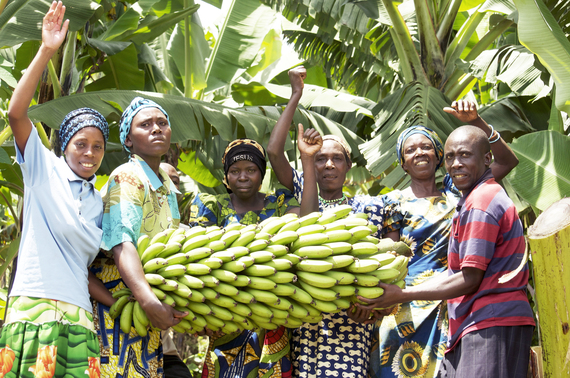Co-authored by Katie Campbell, Food Rights Policy Manager, ActionAid USA
Next week, G7 leaders will gather in Germany to discuss the most pressing topics of the day. While global financial and security issues will be at the top of the agenda, the German government has made certain to prioritize a too-often ignored global crisis affecting nearly one billion people -- global hunger.
The G7 has tried to tackle this problem before, but this summit offers another chance to get it right. The Germans have put an ambitious proposal on the table that will see 500 million people free from hunger and poverty by 2030, due to smart investments in sustainable, small-scale agriculture and nutrition. This could be the beginning of the end of hunger.
But a target alone is not enough. This time we need financial pledges from every G7 government.
Once those pledges are made, the money must go to the right places. In 2012, the G8 got it wrong and promoted its New Alliance initiative that saw agreements struck between 10 African countries, donor governments and 180 companies. African governments committed to making policy changes to give agribusiness companies large tax breaks, access to land and open markets for tractors, patented seeds, chemicals inputs and more.
The New Alliance is already forcing small-scale farmers off their land, and replacing farmers' knowledge and skill with expensive technology and fossil fuel inputs. The G7 needs to end the New Alliance and work with African governments on new policies with the participation of small-scale farmer organizations.
The problem of hunger has never been one of insufficient production, but rather a lack of accessibility of land and food, and a lack of safety nets when natural or man-made disasters hit. Investment that reduces the number of farmers in Africa will only make the problem worse.
The Global Fund for Agriculture
One way the G7 can do this is via the Global Fund for Agriculture (also known as the Global Agriculture and Food Security Program). Launched following the food price crisis of 2008 with leadership from the Obama administration, this fund focuses on long-term agriculture and food security interventions in countries with the greatest need.
This unique fund supports country-led efforts to raise agricultural productivity and stresses country ownership, good governance, inclusivity and high quality monitoring and evaluation. So far the fund has received around $1.5 billion in funding and expects to reach more than 13 million people with improved incomes and food security in 35 countries. The G7 should pledge at least $1.5 billion more to the fund over the next three years to make sure that it can continue to reach small-scale farmers with the investments they need to make their farms flourish.
Investments must also be aligned with the vision that people living in poverty and hunger and their governments have for their own futures. Last year, the African Union Heads of States made a commitment to end hunger by 2025. This bold commitment is meant to transform Africa, building the production and the power of its smallholder farmers which provide 70 percent of the continent's food.
In a recent letter to the G7, African civil society called on world leaders to support Africa's initiative and to make public funding commitments to support the Comprehensive African Agriculture Development Program (CAADP) which will implement the investments meant to end hunger on the continent. The letter points to the $20 billion shortfall that is required from donors for Africa to achieve its target, and calls on donors to make new funding commitments and support programs like the Global Fund for Agriculture.
Finally, the G7 must develop a robust accountability mechanism to track its target and its pledges. The only way to ensure we are on track, that we are reaching the farmers who need it most with sustainable, climate resilient, and appropriate interventions, is to hold ourselves accountable. Global leaders must work together to develop an accountability framework that holds them to disbursements, not just commitments, and that tracks the types of investments they are making, so people living with hunger, and those of us who stand in solidarity with them, can make sure they do not go astray.
Hunger will not be beaten overnight. It will require a determination and commitment that must outlast the latest fad, the latest headline and the most recently elected political party. G7 leaders have an opportunity to turn the tides on hunger and make history this June. We urge the United States and other global leaders to boldly stand up to the challenge before them and to declare 2015 the beginning of the end of hunger.

